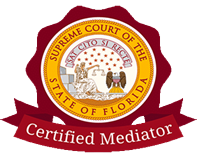Karen L. Johnson, Attorney At Law • (772) 223-5001
Florida Supreme Court Certified Family Law Mediator | South Carolina Certified Family Law Mediator

Karen L. Johnson, Attorney At Law • (772) 223-5001
Florida Supreme Court Certified Family Law Mediator | South Carolina Certified Family Law Mediator

Contested vs Uncontested Divorce: How Do They Differ?
Divorce not only marks the end of a marriage relationship but also entails the complexities of legal norms, making it both a challenging and emotionally charged process. As you enter the divorce process, you may encounter the terms contested divorce and uncontested divorce as ways to categorize divorce.
For a successful divorce, you should be aware of the differences between these two forms of divorce. Let's compare and contrast contested and uncontested divorces, outlining the key differences between the two and giving you an idea of what to expect in each.
Contested Divorce
A contested divorce is a judicial action in which both partners cannot reach an agreement on several matters pertaining to the divorce. In a contested divorce, the court must mediate the couple's disputes and make judgments on their behalf. A disputed divorce differs from one in which the spouses agree on all issues because it requires the participation of the court.
Mediating, arbitrating, or going to trial are several options for settling a contentious divorce. In mediation, a third party acts as an impartial facilitator for the parties to discuss and work out their differences. Instead of going to court, a couple can choose arbitration and have a neutral third party make judgments on their behalf. If these steps do not work, the divorce could go to trial, and a judge would have to make the ultimate choices about the law.
Contested divorces are more difficult and time-consuming to resolve than uncontested ones. A disputed divorce that requires the court's involvement can take well over a year to resolve. It is more costly than an uncontested divorce since it necessitates more legal aid and fees.
It is possible to appeal the judge's ruling in a contentious divorce, which can make the process go much longer and cause additional stress for everyone involved. Factors such as the divorce's complexity, the court's caseload, and the grounds for filing can all impact how long and how much money a contentious divorce takes to resolve. Complex assets or the inclusion of minors can also add unnecessary time.
Uncontested Divorce
In an uncontested divorce, both parties agree on all of the divorce's fundamental issues and legal considerations. This entails determining how to split assets and liabilities as well as making arrangements for child and spousal support. In contrast to contentious divorces, which often require the parties to go through mediation, arbitration, or a trial to resolve their differences, uncontested divorces are often quicker and less complicated.
In an uncontested divorce, both partners can sign a marital settlement agreement that explains how they would like to deal with these concerns. The parties then present this agreement to the court for approval. In many instances, the judge will approve it without holding a trial or hearing.
The amount of time to reach a resolution is often a key distinction between uncontested and contested divorces. Since there is no need for drawn-out legal procedures or court hearings, uncontested divorces can typically be finalized swiftly, subject to the state and courthouse. As a result, the cost of legal representation during an uncontested divorce is typically substantially lower.
A further distinction is that a settlement between both partners in an uncontested divorce is not subject to appeal. Some provisions of the agreement, however, may be subject to revision once a specified period has elapsed or if certain events occur.
Bottom Line
Ultimately, both parties must have a clear grasp of their alternatives and the potential results before making any decisions, regardless of whether the divorce is uncontested or disputed. By working with competent divorce attorneys and even seeking mediation, couples can efficiently come to an understanding together to prevent a lengthy and costly legal battle.
Contact us at the
Law Firm of Karen L. Johnson, P.A., for legal advice and representation in family law in South Florida.
Hours of Operation
Mon - Fri 8:30 am - 5:00 pm
Sat - Sun Appointment Only
Additional hours available by appointment.
The hiring of a lawyer is an important decision that should not be based solely on advertisements. Before you decide, ask the attorney to send you free written information about their qualifications and experience.
The information you obtain at this site is not, nor is it intended to be, legal advice. You should consult an attorney for individual advice regarding your own situation. The information on this website is protected by the copyright laws of the United States and may not be reproduced without the permission of Ms. Johnson.





